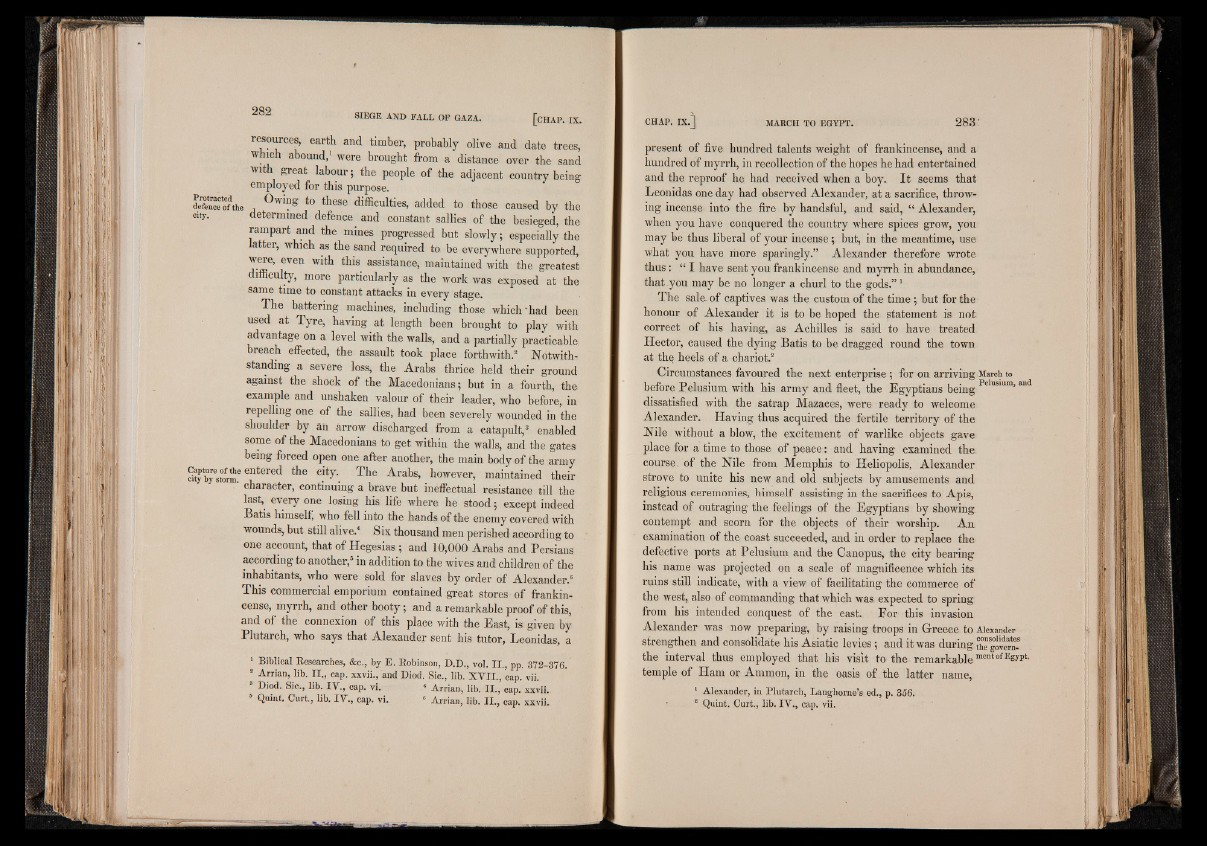
resources, earth and timber, probably olive and date trees,
which abound,1 were brought from a distance over the sand
with great labour; the people of the adjacent country being
employed for this purpose.
defe“ he f ° wing t0 these difficulties, added to those caused by the
cuy. determined defence and constant sallies of the besieged, the
rampart and the mines progressed but slowly; especially the
latter, which as the sand required to be everywhere supported,
were, even with this assistance, maintained with the greatest
difficulty, more particularly as the work was exposed at the
same time to constant attacks in every stage.
The battering machines, including those which'had been
used at Tyre, having at length been brought to play with
advantage on a level with the walls, and a partially practicable
breach effected, the assault took place forthwith.8 Notwithstanding
a severe loss, the Arabs thrice held their ground
against the shock of the Macedonians; but in a fourth, the
example and unshaken valour of their leader, who before, in
repelling one of the sallies, had been severely wounded in the
shoulder by an arrow discharged from a catapult,3 enabled
some of the Macedonians to get within the walls, and the gates
being forced open one after another, the main body of the army
c^byreSto™fe° tered the 4 The Arabs, however, maintained their
character, continuing a brave but ineffectual resistance till the
last, every one losing his life where he stood; except indeed
Batis himself, who fell into the hands of the enemy covered with
wounds, but still alive.4 Six thousand men perished according to
one account, that of Hegesias ; and 10,000 Arabs and Persians
according to another,6 in addition to the wives and children of the
inhabitants, who were sold for slaves by order of Alexander.6
This commercial emporium contained great stores of frankincense,
myrrh, and other booty; and a remarkable proof of this,
and of the connexion of this place with the East, is given by
Plutarch, who says that Alexander sent his tutor, Leonidas, a
1 Biblical Researches, &c., by E . Robinson, D.D., vol. I I ., pp. 372-376.
8 Arrian, lib. I I „ cap. xxvii., and Diod. Sic., lib. X V II., cap. vii.
3 Diod. Sic., lib. IV ., cap. vi. ‘ Arrian, lib. I I ., cap. xxvii.
6 Quint. Curt., lib. IV., cap. vi. 6 Arrian, lib. I I ., cap. xxvii.
present of five hundred talents weight of frankincense, and a
hundred of myrrh, in recollection of the hopes he had entertained
and the reproof he had received when a boy. It seems that
Leonidas one day had observed Alexander, at a sacrifice, throwing
incense into the fire by handsful, and said, “ Alexander,
when you have conquered the country where spices grow, you
may be thus liberal of your incense; but, in the meantime, use
what you have more sparingly.” Alexander therefore wrote
thus: “ I have sent you frankincense and myrrh in abundance,
that you may be no longer a churl to the gods.” 1
The sale, of captives was the custom of the time; but for the
honour of Alexander it is to be hoped the statement is not
correct of his having, as Achilles is said to have treated
Hector, caused the dying Batis to be dragged round the town
at the heels of a chariot.2
Circumstances favoured the next enterprise; for on arriving March to
before Pelusium with his army and fleet, the Egyptians being Pelusium’and
dissatisfied with the satrap Mazaces, were ready to welcome
Alexander. Having thus acquired the fertile territory of the
Nile without a blow, the excitement of warlike objects gave
place for a time to those of peace : and having examined the.
course, of the Nile from Memphis to Heliopolis, Alexander
strove to unite his new and old subjects by amusements and
religious ceremonies, himself assisting in the sacrifices to Apis,
instead of outraging the feelings of the Egyptians by showing
contempt and scorn for the objects of their worship. An
examination of the coast succeeded, and in order to replace the
defective ports at Pelusium and the Canopus, the city bearing
his name was projected on a scale of magnificence which its
ruins still indicate, with a view of facilitating the commerce of
the west, also of commanding that which was expected to spring
from his intended conquest of the east. For this invasion
Alexander was now preparing, by raising troops in Greece to Alexander
strengthen and consolidate his Asiatic levies; and it was during a ” gOT^
the interval thus employed that his visit to the remarkable mentofEgypt’
temple of Ham or Ammon, in the oasis of the latter name,
1 Alexander, in Plutarch, Langborne’s ed., p. 356.
8 Quint. Curt., lib. IV ., cap. vii.